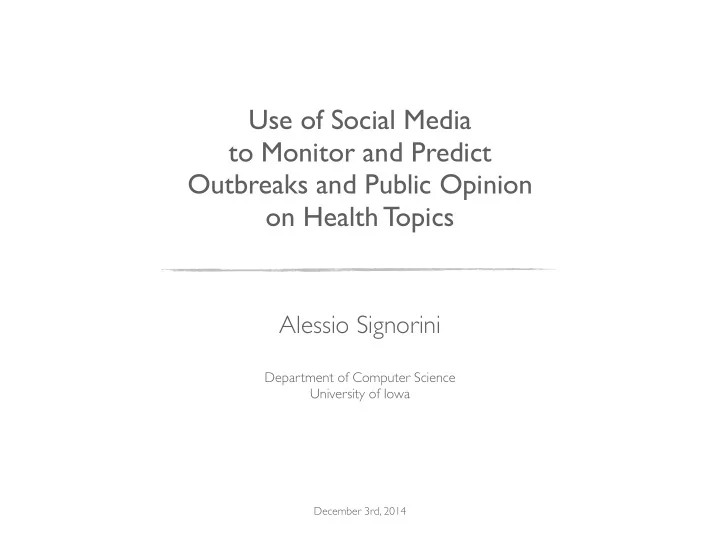

Use of Social Media to Monitor and Predict Outbreaks and Public Opinion on Health Topics Alessio Signorini Department of Computer Science University of Iowa December 3rd, 2014
“ Measurement is the first step that leads to control and eventually to improvement. “ - James Harrington
Data Analytics • Nascar / Formula One • Sports • Insurances • Sales / Marketing • Online Advertising • Logistics
in Public Health we have Disease Surveillance
Surveillance Systems • Vital Statistics & Registries (e.g., births, deaths, defects) • Population Surveys (e.g., substance abuse) • Disease Reporting (e.g., salmonellosis, measles) • Sentinel Surveillance (e.g., Influenza-Like Illnesses) • Adverse Events Surveillance (e.g., issues with drugs) • Laboratory Data
surveillance data should be a byproduct of any healthcare operation
Syndromic Surveillance • Focuses on Early Detection • Based on disease signs or symptoms, not diagnosis • Novel sources: Emergency Room data, Drugs sales • Uses well known Data Mining techniques • Reduced delay in results
aggregate and analyze Social Media Data to monitor and predict health trends
online mobile ~27h/mon ~34h/mon ~5B/day 5% 22% 13% ~500M/day 19% 21% 20% ~7M/day Social Search Content Email/IM Video Shopping ~10M/day
vs. Google Searches Monitor Public Opinion Positive Tweets Comprehensive Exam Alessio Signorini University of Iowa, May 2010
The Use of Twitter to Track Levels of Disease Activity and Public Concern in the U.S. during the Influenza A H1N1 Pandemic Alessio Signorini, Alberto Segre, Philip Polgreen PLoS ONE – Journal, May 2011
error ~0.28% Estimate ILI% error ~0.37% Using Twitter to Estimate H1N1 Activity Alessio Signorini, Alberto Segre, Philip Polgreen ISDS 2010 – 9th Annual Conference of International Society for Disease Surveillance
National Monitor Travels Local Inferring Travel from Social Media Alessio Signorini, Alberto Segre, Philip Polgreen ISDS 2011 – 10th Annual Conference of International Society for Disease Surveillance
can we use “Social Travel Models” to improve local flu trends prediction?
City-Level Flu Trends • CDC’s MMWR - Flu & Pneumonia Deaths for 122 cities • Smoothed each week with values of prev/next 2 weeks Philadelphia, PA - Deaths for 2012 New York City, NY - Deaths for 2012
Social Travel Data • 240 Million geolocated tweets posted by 4 Million users • Mapped over MMWR cities, discarded overlapping ones • Used Spark cluster of 8 machines to do geo-mapping TKG COL SPK FAT Volume of Trips among MMWR cities 2012
Social Travel Model • Final dataset: 78 cities, 124M tweets, 2.2M users • Assumed “home” the most common location • A “trip” was a post at home followed by one elsewhere • Used population to scale volume of trips between cities
Correlation b/w Cities Atlanta, GA Philadelphia, PA San Jose, CA
Predicting Flu Trends • Flu Trends of 78 cities generated from MMWR data • Used 2011 for training and 2012 for testing • Support Vector Regression with polynomial kernel • Target: value of local flu trend for that week • Features: value of top 20 correlated cities 2 weeks before
Measures Compared • Distance closest 20 cities • Similarity most similar 20 cities on 2011 flu trends • Flow top 20 cities by number of visitors
Prediction Results Dallas, TX San Jose, CA
Failure Hypothesis • Port-of-entry influenced by international travels • Noisy data Watebury, CT had only 43 deaths in 2011 • Few data Fort Wayne has 1/50th of Las Vegas’ users Washington, DC - Flu Deaths 2012
Conclusions • Social Media can be an important source for surveillance • Can predict American Idol’s winner ;) • Allows to monitor public sentiment about health topics • Can effectively be used to monitor ILI% in real time • Geolocated posts can be used to create travel models • Social Travel Data provides additional predictive power for flu trends
Checkins Distributions 100% 99% 97% 100% 85% 90% 80% 70% 60% 50% 50% 40% 30% 20% 10% 0% 0 < 1 mile 1 < 10 miles 10 < 100 miles 100 < 1000 miles 1000 < 10000 miles % Trips % Cumulative 97% 16% 89% 81% 14% 69% 12% 59% 10% 46% 8% 38% 31% 6% 21% 24% 4% 15% 8% 2% 4% 1% 0% 0% 10s 30s 1m 2m 5m 10m 15m 30m 1h 2h 6h 12h 1d 2d 1w % Trips % Cumulative
Denver, CO Distance Similarity Flow
Smoothing Methods 5 weeks ahead 1 week around 2 weeks around
Recommend
More recommend